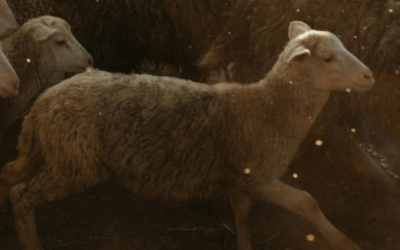Have you ever imagined what Jesus’ return will be like? This question most likely brings different thoughts and images to mind. Regardless of whatever you specifically imagine, the book of Revelation unveils what His return will actually be like. Revelation 19 is a portrait of Jesus returning to judge and make war. We see Him riding a white horse with fire in His eyes and a sword coming from His mouth. It will be a day that brings ultimate and eternal consequences. The message of Revelation 19 is clear and unmistakable: Jesus wins.
This image of Jesus returning to judge and make war may make you cringe a little. The Jesus we prefer is a benevolent, kind sage who offers us guidance. Cultural Christianity wants Jesus to be good to us but cringes at a Jesus that rules over us. Contrastingly, the Jesus of the Bible makes both peace and war. For Christ to be the One who delivers us from evil, He must also be the one to defeat evil wherever it exists.
Sermon Recap: Understanding the Symbolism of Revelation 19
Read Revelation 19:11-21:
“Then I saw heaven opened, and behold, a white horse! The one sitting on it is called Faithful and True, and in righteousness he judges and makes war. His eyes are like a flame of fire, and on his head are many diadems, and he has a name written that no one knows but himself. He is clothed in a robe dipped in blood, and the name by which he is called is The Word of God. And the armies of heaven, arrayed in fine linen, white and pure, were following him on white horses. From his mouth comes a sharp sword with which to strike down the nations, and he will rule them with a rod of iron. He will tread the winepress of the fury of the wrath of God the Almighty. On his robe and on his thigh he has a name written, King of kings and Lord of lords. Then I saw an angel standing in the sun, and with a loud voice he called to all the birds that fly directly overhead, ‘Come, gather for the great supper of God, to eat the flesh of kings, the flesh of captains, the flesh of mighty men, the flesh of horses and their riders, and the flesh of all men, both free and slave, both small and great.’ And I saw the beast and the kings of the earth with their armies gathered to make war against him who was sitting on the horse and against his army. And the beast was captured, and with it the false prophet who in its presence had done the signs by which he deceived those who had received the mark of the beast and those who worshiped its image. These two were thrown alive into the lake of fire that burns with sulfur. And the rest were slain by the sword that came from the mouth of him who was sitting on the horse, and all the birds were gorged with their flesh.”
The book of Revelation is filled with language and symbolism meant to grab our attention. In this specific text, I want to draw your attention to three things: Christ’s appearance, Christ’s identity, and Christ’s victory.
Christ’s Appearance
The first thing that grabs our attention in this passage is Christ sitting on a white horse. The white horse is a symbol of victory, pointing to the fact that He will win in the end.
In verse 12, we also notice that “His eyes are like a flame of fire.” Nothing escapes Jesus’ gaze. He sees everything we do, and we cannot hide our deeds. With such piercing vision, He knows our every thought and motive.
Verse 12 also points out the fact that “on his head are many diadems.” Diadems are crowns representing His rule and kingship. There are so many crowns on His head that a number is not even given. Earlier in Revelation 13, the best is described with ten crowns. Ten crowns represent great authority, perhaps authority over ten nations. But ten nations is small compared to Christ’s dominion! He rules all nations with total control!
Christ is also wearing a “robe dipped in blood.” Now, whose blood is this? The picture here is of the conquering warrior who has won the victory. As He rode through the battlefield mounted on His horse, the end of His robe dipped into the blood that flowed from His enemies. Look back at Isaiah 63:3: “I have trodden the winepress alone, and from the peoples no one was with me; I trod them in my anger and trampled them in my wrath; their lifeblood spattered on my garments, and stained all my apparel.” Only Christ has blood on His robes. The armies of heaven following Him (which are both angels and God’s people) are arrayed in “fine linen, white and pure.” Their garments are stain-free. Both Isaiah 63 and Revelation 19 make the point that Christ alone wins the victory for His people.
Lastly, we see that “from his mouth comes a sharp sword.” The word of Jesus separates truth and falsehood. His word is the ultimate authority, and at His word, nations will crumble. He will strike down, rule, and tread upon all who oppose Him.
Christ’s Identity
In verse 11, Jesus is referred to as being “called Faithful and True.” The first aspect of Christ’s identity that we see in this text is that Jesus can be trusted 100% of the time. When Jesus judges and makes war, He does so in righteousness. Everything He does is completely right. Our sense of justice and injustice is flawed, but He has perfect knowledge. He has, does, and will forever use His authority for good because He himself is good. He is Faithful and True.
A second identifier can be found in verse 12: “a name written that no one knows but himself.” At the beginning of the world, God created Adam and gave him dominion over the earth. Adam exercised that dominion by giving names to the creatures. In this, we see that naming is an act of dominion and authority. So what does it mean that Jesus has a name that no one knows but Himself? It signifies that He is under no one else’s authority. All authority in heaven and earth is His.
The third identifier is in verse 13: “and the name by which he is called is the Word of God.” Jesus is the Word of God. Not only does Jesus make God known to us, but Jesus also created the world and will forever rule the world.
Lastly, look at verse 16: “On his robe and on his thigh he has a name written, King of kings and Lord of lords.” This is another description of Jesus’ total authority and power. He has no equal and no rival, and one day every knee will bow before Him.
Christ’s Victory
In verses 17-21, John records for us a vision of an angel calling to all the birds of the air to gather to feast of the flesh of the defeated. Christ’s enemies are not merely wounded. They are laid waste. The only thing that’s left of them is for the birds to consume. In this vision, we see that Christ’s victory is swift, and His victory is extensive. Once again, the point of Revelation 19 that is not up for debate is that in the end, Jesus wins!
The effect of this passage and image is twofold: To give hope and to give warning. With victory, there is corresponding defeat. Jesus’ return will be historical, personal, undeniable, inescapable, and every person will experience either relief or terror. No one who wars against Christ will stand, but those who stand with Christ will be saved!
Application: Two Questions to Ask Yourself
Ask yourself: Are you at war with God? Maybe you immediately think, “I don’t hate God! I’m not trying to convince others that God doesn’t exist or anything like that!” But being at war with God is anything less than total allegiance to His authority. So, who is the authority in your life? 2 Thess. 1:8 says that Jesus will come and inflict “vengeance on those who do not know God and on those who do not obey the gospel of our Lord Jesus.” The gospel is not good advice or rules we try to follow to please God. The gospel is good news. It’s a declaration of what God, in Christ, has already done. It is the news of what Jesus did in His first coming roughly 2,000 years ago. He come to earth, obeyed God perfectly in every way, and then willingly substituted Himself to die in our place. He took our sins and wrongs upon Himself and died on a cross as the payment for our sins. When He returns, He will carry out God’s wrath, but for those who have believed and trusted in this gospel, Jesus has already absorbed God’s wrath for them.
Secondly, are you resting in Christ’s victory? We rest in Christ’s victory in three ways:
- We rest in Christ’s victory when we confess sin instead of minimizing it.
- We rest in Christ’s victory when we remember that vengeance is the Lord’s, and He will repay with justice.
- We rest in Christ’s victory when we remain faithful to God’s Word.
Trust in the gospel and rest in His victory today. The battle is already won!
-Bryan Miller (Pastor of Care)
Watch the full sermon from week five below:



